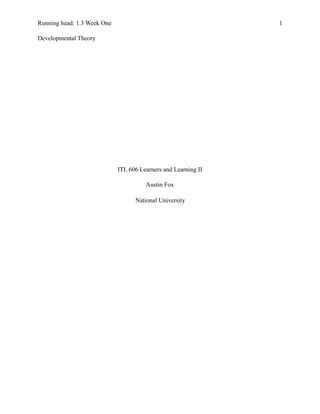
ITL606 1.3 Developmental Theory - Fox
- 1. Running head: 1.3 Week One Developmental Theory !1 ITL 606 Learners and Learning II Austin Fox National University
- 2. Running head: 1.3 Week One Developmental Theory !2 Theories of development are important to understand as a teacher. In the field of developmental psychology there are three highly influential theorists. These theorists are Jean Piaget, Lev Vygotsky, and Lawrence Kohlberg. While all three of their theories are influential, they differ in many ways. In the text by Slavin it states that “Piaget’s theory of cognitive development proposes that a child’s intellect, or cognitive ability, progresses through four distinct stages. Each stage is characterized by the emergence of new abilities and ways of processing information.” (Slavin Ch. 2 p. 24). Piaget and Vygotsky were both familiar with each other’s work. In fact, Vygotsky was a well-respected critic of Piaget’s work. According to Slavin, “Vygotsky’s work is based on two key ideas. First, he proposed that intellectual development can be understood only in terms of the historical and cultural contexts children experience. Second, he believed that development depends on the sign systems that individuals grow up with: the symbols that cultures create to help people think, communicate, and solve problems. Examples include a culture’s language, its writing system, and its counting system.” (Slavin Ch. 2 p. 33). I argue that the biggest differences between Vygotsky and Piaget’s theories is that Vygotsky theorizes that development is highly effected by environmental circumstances, and Piaget’s theory focuses on nature playing a greater role in childhood development. In comparison to these two theories, “Kohlberg’s stage theory of moral reasoning is an elaboration and refinement of Piaget’s. Like Piaget, Kohlberg studied how children (and adults)
- 3. Running head: 1.3 Week One Developmental Theory !3 reason about rules that govern their behavior in certain situations. Kohlberg did not study children’s game playing, but rather probed for their responses to a series of structured situations or moral dilemmas." (Slavin Ch. 3 p. 49). Kohlberg differs from the other two theorists in that his work is focused on moral development rather than cognitive and intellectual development. The text then goes on to state that “Kohlberg proposed that people pass through a series of six stages of moral judgment or reasoning.” (Slavin Ch. 3 p. 49). Similar to Piaget, Kohlberg’s work is also concerned with reasoning. The theory I would like to focus on for this section is Vygotsky’s theory of cognitive development. I have interest in examining this theory as someone who studied international relations in my undergraduate career. Vygotsky’s work argues that cognitive development is significantly effected by environmental factors. One of these factors that he focuses on throughout his work is language. Part of Vygotsky’s theory described in the Slavin text states that “Vygotsky proposed that children incorporate the speech of others and then use that speech to help themselves solve problems. Private speech is easy to see in young children, who frequently talk to themselves, especially when faced with difficult tasks. Later, private speech becomes silent but is still very important. Studies have found that children who make extensive use of private speech learn complex tasks more effectively than do other children.” (Slavin Ch. 2 p. 33). As a future educator in California, I believe that Vygotsky’s theory is extremely important to understand. This is because it is highly likely that I will teach in a diverse student setting, and could potentially be teaching students who have limited English language skills.
- 4. Running head: 1.3 Week One Developmental Theory !4 Examples of Vygotsky’s theory are wide-spread in public education. One personal example of his theory that I experienced happened when I was a substitute teacher for an English Language Learner class at Florin High School in Sacramento, California. I noticed how the students in the class were a diverse group. I also notice however, that the students tended to stick with their peers who have the same native language. This example displays Vygotsky’s theory because it supports his idea that “the symbols that cultures create to help people think, communicate, and solve problems” (1), such as language, have an effect on childhood development. I believe that my example fits into Vygotsky’s theory because it suggests that students with the same native tongue will stick together because their brains have had a significant amount of development in that language. Vygotsky, Kohlberg, and Piaget’s theories all hold a valuable place in educational psychology. Their theories have their differences, but all help us have a better understanding of childhood development and the role that educators play in it. I chose to examine Vygotsky’s theory because I felt that it was the most relevant to my own personal experiences. Learning and examining his work has given me a stronger understanding of the way that environmental factors (ie. Culture and language) can effect development. I look forward to studying developmental theories such as Vygotsky’s in more depth throughout this program.
- 5. Running head: 1.3 Week One Developmental Theory !5 References 1.) Educational Psychology, Robert E. Slavin, Ch. 2 p. 24, 33; Ch. 3 p. 49